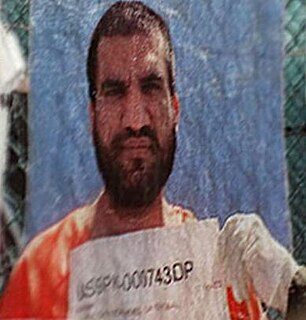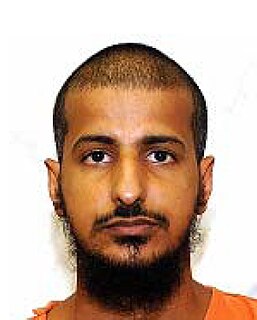
Hisham Sliti, is a citizen of Tunisia who was held in extrajudicial detention in the United States Guantanamo Bay detention camps, in Cuba. His Guantanamo Internment Serial Number is 174. The list of the names of all the Guantanamo detainees states that his date of birth was February 12, 1966, in Hamam Lif, Tunisia. He was transferred to Guantanamo on May 1, 2002, and held there for twelve and a half years. On November 20, 2014, Sliti and Hussein Salem Mohammed were granted asylum in Slovakia.
Salah Abdul Rasool Al Blooshi is a Bahraini, who was held in extrajudicial detention in the United States Guantanamo Bay detainment camps, in Cuba.
Majid Mahmud Abdu Ahmad is a citizen of Yemen who was held in extrajudicial detention in the United States Guantanamo Bay detainment camps, in Cuba. His Guantanamo Internee Security Number is 41. The Department of Defense reports that he was born on June 15, 1980, in Al Buraiqeh District, Yemen.
Al Wafa is an Islamic charity listed in Executive Order 13224 as an entity that supports terrorism. United States intelligence officials state that it was founded in Afghanistan by Adil Zamil Abdull Mohssin Al Zamil, Abdul Aziz al-Matrafi and Samar Khand.
Abdullah Mujahid is a citizen of Afghanistan who is still held in extrajudicial detention after being transferred from United States Guantanamo Bay detainment camps, in Cuba — to an Afghan prison.

Muhammad Saad Iqbal is a Pakistani citizen who was held in extrajudicial detention in the United States Guantanamo Bay detention camps, in Cuba. Madni's Guantanamo Internment Serial Number was 743. The Department of Defense reports that he was born on October 17, 1977.
Hamidullah is a citizen of Afghanistan, who was held in extrajudicial detention in the United States's Guantanamo Bay detention camps, in Cuba. His Guantanamo Internee Security Number is 1119. Joint Task Force Guantanamo counter-terrorism analysts estimate he was born in 1963, in Kabul, Afghanistan.

Omar Khalifa Mohammed Abu Bakr is a citizen of Libya who was held in extrajudicial detention in the United States' Guantanamo Bay detention camps, in Cuba, from August 5, 2002, until April 4, 2016. Abu Bakr's Guantanamo detainee ID number is 695. American intelligence analysts estimate that Abu Bakr was born in 1972 in Al Bayda [sic], Libya.

Othman Ahmed Othman Al Omairah(also transliterated as Othman Ahmad Othman al-Ghamdi) was a citizen of Saudi Arabia, who was held in extrajudicial detention in the United States Guantanamo Bay detainment camps, in Cuba.
American counter-terrorism analysts justified the continued extrajudicial detention of many Guantanamo captives because they were suspected of staying in al-Qaeda safe houses, or guest houses—or because names matching theirs, or their "known alias" were found in the suspect houses.

Tarek Ali Abdullah Ahmed Baada is a citizen of Yemen, held in extrajudicial detention in the United States Guantanamo Bay detainment camps, in Cuba. His detainee ID number is 178. Joint Task Force Guantanamo counter-terrorism analysts estimate that Baada was born in 1976, in Shebwa, Yemen.

Zahar Omar Hamis Bin Hamdoun is a citizen of Yemen, held in extrajudicial detention in the United States Guantanamo Bay detainment camps, in Cuba. His Guantanamo Internment Serial Number is 576. The Department of Defense reports that he was born on November 13, 1979, in Ash Shihr, Yemen.
Mahmud Salem Horan Mohammed Mutlak Al Ali is a citizen of Syria, best known for the more than eight years he spent in the Guantanamo Bay detention camps in Cuba after being classified as an enemy combatant by the United States. His Guantanamo Internment Serial Number was 537. Joint Task Force Guantanamo counter-terrorism analysts report that Mahmud Salem Horan Mohammed Mutlak Al Ali was born on May 5, 1974, in Doha, Kuwait.
The American intelligence analysts who compiled the justifications for continuing to detain the captives taken in the "war on terror" made dozens of references to al Qaida safe houses, in Karachi, Pakistan.
Initially the Bush Presidency asserted that they did not have to release any of the Guantanamo captive's documents. They asserted that no captive apprehended in Afghanistan was entitled to the protections of the Geneva Convention, and that those held in the Guantanamo Bay Naval Base were not protected by US law either, because it was not on US territory.

Omar Said Salim Al Dayi is held in extrajudicial detention in the United States Guantanamo Bay detention camps, in Cuba. His Guantanamo Internee Security Number is 549.
A group of prisoners at the Guantanamo Bay detention camp, the Dirty Thirty were believed to be the "best potential sources of information" and consequently the chief focus of the harshest methods of interrogation. Many of these captives were alleged to be Osama bin Laden bodyguards, or associates of Osama bin Laden.

Muhammaed Yasir Ahmed Taher was a citizen of Yemen, who was held in extrajudicial detention in the United States's Guantanamo Bay detention camps, in Cuba. His Guantanamo Internment Serial Number was 679. American intelligence analysts estimate he was born in 1980, in Ib, Yemen.








